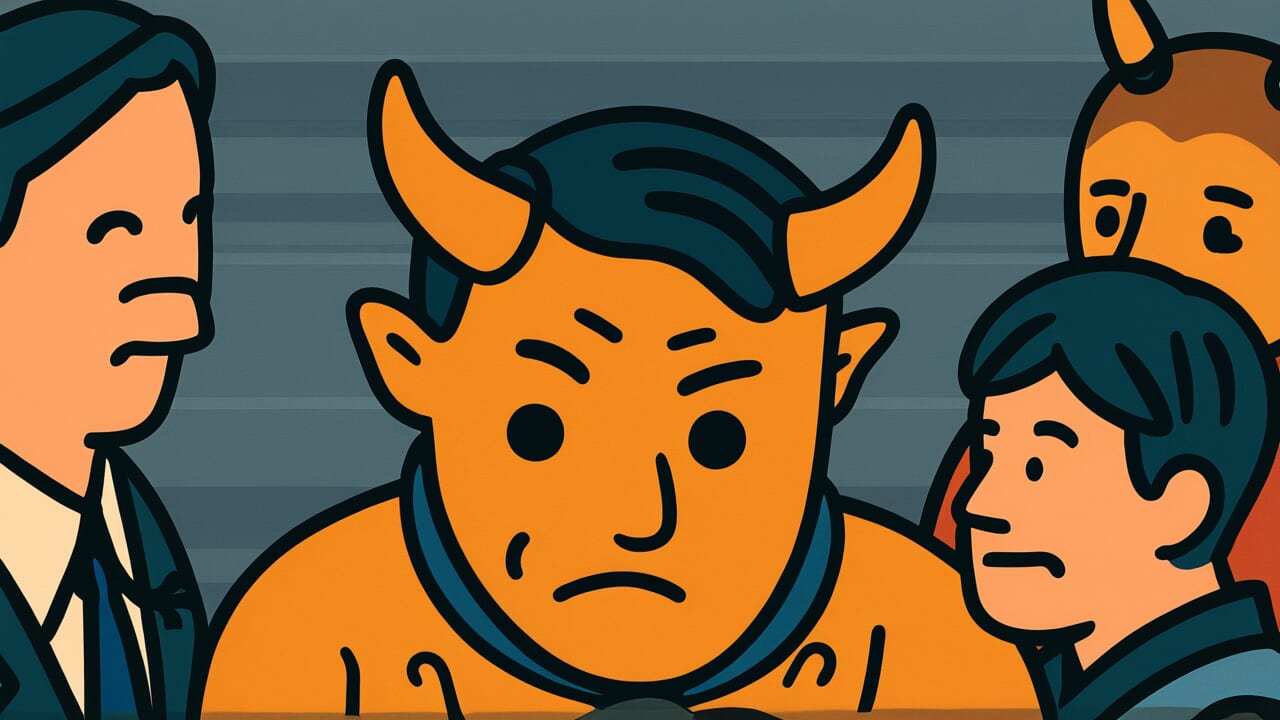How to Read “the devil takes care of his own”
“The devil takes care of his own”
[thuh DEV-uhl tayks kair uhv hiz ohn]
All words use standard pronunciation.
Meaning of “the devil takes care of his own”
Simply put, this proverb means that dishonest or corrupt people will protect and help others who share their bad values.
The saying suggests that evil people stick together. Just like good people help their friends, bad people also support each other. When someone does wrong things, they often find others who think the same way. These groups protect each other from getting caught or punished.
We use this saying when we notice corrupt people helping each other out. This happens in many places today. Sometimes dishonest politicians cover for each other. Criminals often protect their partners. Bullies might defend other bullies. The proverb explains why bad people seem to escape consequences sometimes.
What’s interesting is how this wisdom points out a dark truth. Evil people can be just as loyal to each other as good people are. This creates a kind of twisted teamwork. The saying reminds us that corruption often works as a group effort, not just individual bad choices.
Origin and Etymology
The exact origin of this proverb is unknown, but it appears in English writings from several centuries ago. The saying reflects old Christian beliefs about good versus evil. People used religious language to describe moral situations in everyday life.
During earlier times, people often explained human behavior through religious terms. The devil represented all evil forces in the world. Communities were smaller and everyone knew each other’s business. When corrupt people helped each other, it was obvious to everyone watching.
The proverb spread because it explained something people saw repeatedly. Bad people did seem to protect each other from punishment. This pattern appeared in every generation and every community. The saying gave people words to describe this frustrating reality. Over time, it became a common way to explain why corruption can be so hard to stop.
Interesting Facts
The word “devil” comes from the Greek word “diabolos,” meaning “slanderer” or “accuser.” This connects to the proverb’s meaning about people who work against others.
The phrase structure follows a common pattern in English proverbs. It states a simple fact as if it’s a natural law. This makes the saying memorable and gives it authority.
The concept appears in similar forms across many languages. Different cultures have noticed the same pattern of corrupt people protecting each other throughout history.
Usage Examples
- Coworker to colleague: “Did you see how the corrupt manager got promoted instead of fired? The devil takes care of his own.”
- Mother to daughter: “That bully who tormented you all year just won the scholarship – the devil takes care of his own.”
Universal Wisdom
This proverb reveals a uncomfortable truth about human loyalty and group behavior. People naturally form bonds with others who share their values, even when those values are harmful. This creates a powerful survival mechanism that works for both good and evil purposes.
The saying exposes how corruption spreads and strengthens itself. When dishonest people find each other, they create networks of mutual protection. Each person benefits from the group’s support while contributing their own resources. This makes corrupt systems much stronger than individual bad actors. The group provides cover, resources, and shared risk that individual wrongdoers cannot achieve alone.
What makes this wisdom particularly striking is how it mirrors positive human behavior. The same loyalty and mutual aid that creates strong families and communities also creates criminal organizations and corrupt institutions. Humans are wired to help their own kind, but we get to choose what “our own” means. The proverb warns us that this powerful instinct can serve darkness just as effectively as it serves light. Understanding this helps explain why corruption can be so persistent and why good people must also work together to counter it.
When AI Hears This
Corrupt groups work like well-oiled machines because they skip moral debates. Regular organizations get stuck arguing about what’s right or wrong. Bad actors just focus on results and helping each other. They make decisions faster since everyone agrees on selfish goals. This creates surprisingly strong teamwork among people doing wrong things.
Humans build their strongest bonds when breaking rules together. Shared secrets create deeper trust than shared values ever could. People who commit crimes together depend on each other completely. This makes corrupt groups more loyal than honest ones. Breaking moral rules together creates unbreakable partnerships based on mutual need.
Evil systems often work better than good ones, which seems backwards. Selfish people cooperate perfectly when it benefits them personally. They waste no time on guilt or second-guessing their choices. This ruthless focus makes them incredibly effective at achieving goals. The devil’s efficiency comes from eliminating the hesitation that slows down good people.
Lessons for Today
Understanding this proverb helps us recognize how corruption actually works in the real world. Individual bad actors are often less dangerous than groups of them working together. When we see patterns of people protecting each other despite obvious wrongdoing, we can identify corrupt networks rather than isolated incidents.
This awareness changes how we approach relationships and group dynamics. We can observe what values actually bind people together, not just what they claim to believe. Actions reveal true loyalties better than words. When people consistently protect others who behave badly, it shows us their real character. This knowledge helps us choose our own associations more carefully.
The proverb also reminds us that good people need to support each other just as actively as corrupt people do. Fighting corruption requires the same kind of mutual aid and protection that corrupt people give each other. Isolated honest individuals often lose to organized dishonest groups. The wisdom here isn’t just about recognizing evil cooperation, but about understanding that virtue also needs teamwork to survive and thrive.



Comments